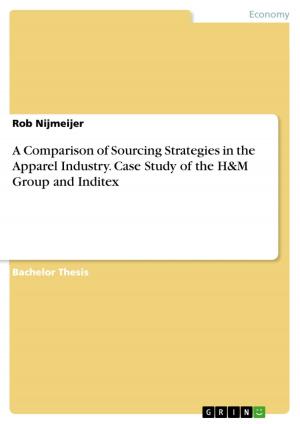Financial Management
The role and importance of capital markets and EMH
Business & Finance, Finance & Investing, Finance| Author: | Arkadi Borowski | ISBN: | 9783640622092 |
| Publisher: | GRIN Publishing | Publication: | May 12, 2010 |
| Imprint: | GRIN Publishing | Language: | English |
| Author: | Arkadi Borowski |
| ISBN: | 9783640622092 |
| Publisher: | GRIN Publishing |
| Publication: | May 12, 2010 |
| Imprint: | GRIN Publishing |
| Language: | English |
Seminar paper from the year 2010 in the subject Business economics - Investment and Finance, grade: 1.0, University of Sunderland, language: English, abstract: The role and importance of capital markets and EMH Crisp plc has to attract investments from capital markets. A capital market is simply any market where a government or a company (usually a corporation) can raise money (capital) to fund their operations and long term (periods longer than a year) investment.[1] Usual, short-term funds can be founded on other markets (e.g., the money market). The capital market consists of the stock market (equity securities) and the bond market (debt). Bonds and stocks are two ways to generate capital of any company. New issues of bonds and stocks are placed on primary capital markets by way of underwriting among investors. All money, received during underwriting, goes to company (Crisp plc) for its investment purposes. And placed bonds and stocks are sold and bought among other investors or traders in the secondary capital markets (a securities exchange, over-the-counter, or elsewhere). The prices of securities (both bonds and stocks) on secondary markets are reflected «real» price of company. It is good benchmark for primary placements of additional issues of bonds and/or stocks (further extension of the company). Crisp plc is going to issue bond or stocks. It means that it attract money from primary markets. Here very important thing is true price of bonds and/or stocks of Crisp plc, i.e. price has to be interesting for investors and allows to attract maximum of money. As stated above, prices of securities on secondary markets are reflected «real» price of company from point of view of investors. Here the efficient-market hypothesis (EMH) plays very important role, because it is the tool of securities pricing of off-site investors (which are outside of the company). According to the efficient-market hypothesis (EMH), which was developed by Professor Eugene Fama, financial markets are «informationally efficient».[2] It means that prices on traded assets are «real» and already reflect all known information. Prices change to reflect new information (for example, new investment program of the company). Consequently, it is impossible to consistently outperform the market by using any information that the market already knows. Information or news in the EMH is defined as anything that may affect prices that is unknowable in the present and thus appears randomly in the future.
Seminar paper from the year 2010 in the subject Business economics - Investment and Finance, grade: 1.0, University of Sunderland, language: English, abstract: The role and importance of capital markets and EMH Crisp plc has to attract investments from capital markets. A capital market is simply any market where a government or a company (usually a corporation) can raise money (capital) to fund their operations and long term (periods longer than a year) investment.[1] Usual, short-term funds can be founded on other markets (e.g., the money market). The capital market consists of the stock market (equity securities) and the bond market (debt). Bonds and stocks are two ways to generate capital of any company. New issues of bonds and stocks are placed on primary capital markets by way of underwriting among investors. All money, received during underwriting, goes to company (Crisp plc) for its investment purposes. And placed bonds and stocks are sold and bought among other investors or traders in the secondary capital markets (a securities exchange, over-the-counter, or elsewhere). The prices of securities (both bonds and stocks) on secondary markets are reflected «real» price of company. It is good benchmark for primary placements of additional issues of bonds and/or stocks (further extension of the company). Crisp plc is going to issue bond or stocks. It means that it attract money from primary markets. Here very important thing is true price of bonds and/or stocks of Crisp plc, i.e. price has to be interesting for investors and allows to attract maximum of money. As stated above, prices of securities on secondary markets are reflected «real» price of company from point of view of investors. Here the efficient-market hypothesis (EMH) plays very important role, because it is the tool of securities pricing of off-site investors (which are outside of the company). According to the efficient-market hypothesis (EMH), which was developed by Professor Eugene Fama, financial markets are «informationally efficient».[2] It means that prices on traded assets are «real» and already reflect all known information. Prices change to reflect new information (for example, new investment program of the company). Consequently, it is impossible to consistently outperform the market by using any information that the market already knows. Information or news in the EMH is defined as anything that may affect prices that is unknowable in the present and thus appears randomly in the future.















